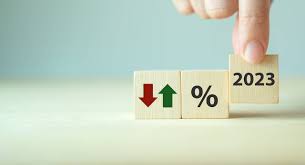By: ADMIN |
2023-03-10 00:21:12

U.S. mortgage rates have fallen, stock prices are up, and yields on corporate debt have dropped, all signs that financial conditions are easing. But unlike this past summer U.S. central bankers may this time be mostly okay with it. The Fed next week is expected to slow increase in interest rates and settle for 50- basis points only, taking the rate to 4.25%, with expectations of touching 4.6%. Fresh projections by Fed policymakers released after next week's meeting are expected to reflect that, along with a forecast for no cuts to the policy rate until end of 2023. The Fed raised rates by 75 basis points at the beginning of November for the fourth straight meeting as it tries to wrestle inflation closer to its 2% target with the most aggressive tightening since the 1980s.
A group of economists surveyed by Bloomberg projected the U.S. central bank will raise the benchmark federal funds rate to a peak of 4.9% in 2023. The economists in the survey expect the Fed to cut rates to 4% by June 2024 and to 3.5% by the end of that year. They also expect Fed officials to indicate they are bracing for slower growth in 2023 and slightly higher unemployment than they previously laid out in September.
According to an op-ed in The-Guardian by Joseph Stiglitz, the famous Nobel Laureate economist, inflation is now on a downward slide. Wage rises, which was contributing to inflation is basically flattening the inequality curve, that had shot-up during pandemic as large companies increase their profits and reduced wages. Current inflationary pressure, according to Stiglitz, is also an outcome of the pandemic. Inflation will reduce with higher supply, and this will require investments. Higher rates will impede these investments and thus not help reduce inflation. Housing inflation also needs more housing supply, higher interests will do the opposite.